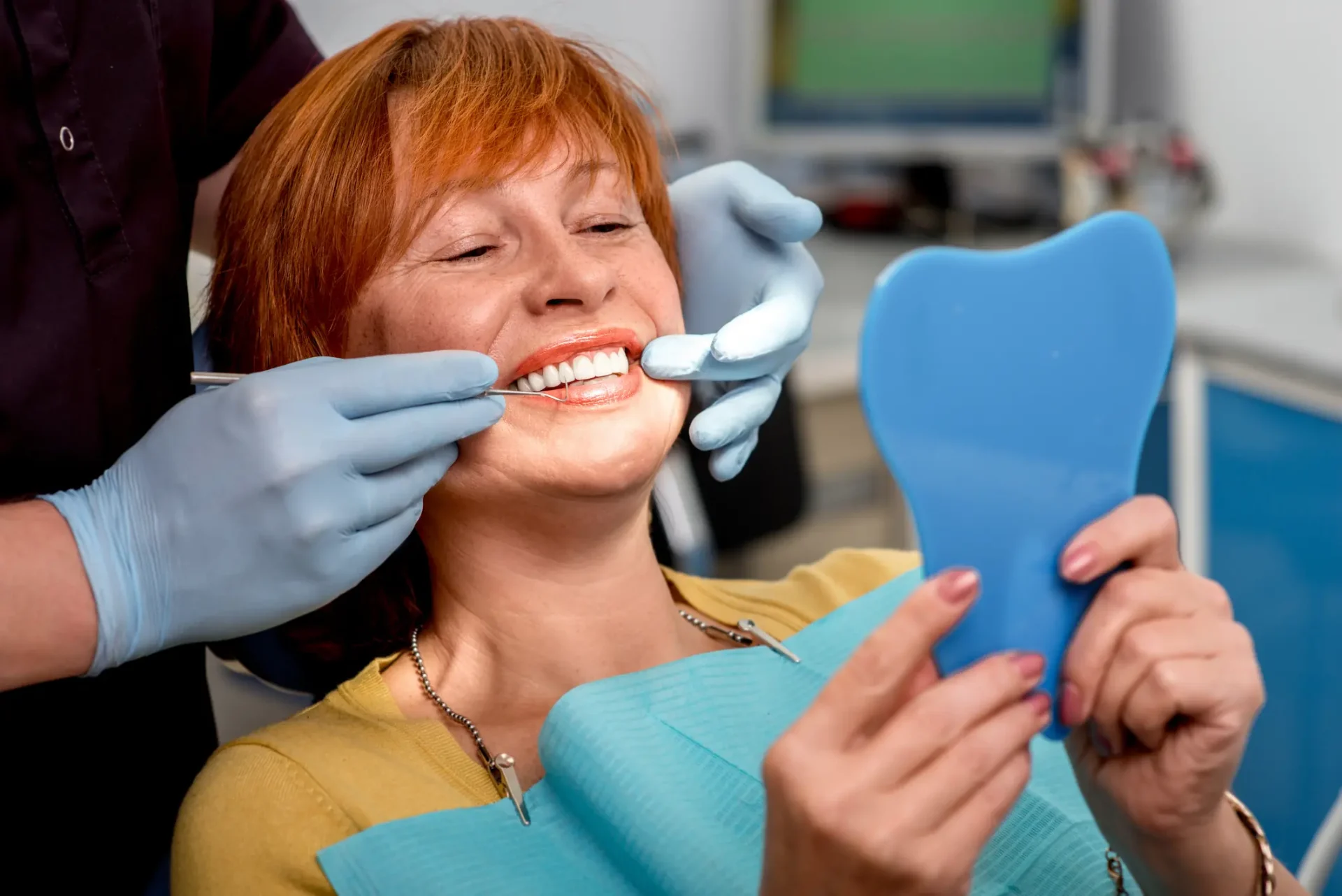If you’ve ever left a dental cleaning running your tongue over your teeth like you just got a new set (same teeth, new vibe), you already know cleanings feel great. But the deeper perks? They’re sneakier than plaque in a hard-to-reach molar.
Professional cleanings aren’t just for sparkle and selfies; they’re one of the most underrated wellness habits you can keep. Think of them as a quarterly reset button for your mouth and your body like getting your oil changed before the engine light comes on, except the “engine” is the only one you’ve got.
This is an opinionated love letter to preventive dentistry, written for anyone who’s ever thought, “My teeth don’t hurt. I can skip this one.” Spoiler: you’ll want to un-skip it.
How Can Oral Health Impact Your Overall Body?
Let’s start with the headline: your mouth is not an isolated island—it’s Times Square on New Year’s Eve. Busy. Messy. Full of guests that may or may not be invited. When gum tissues are healthy, they’re like good security guards: calm, alert, and keeping the peace. When they’re inflamed or infected (hello, gingivitis and periodontitis), bacteria and inflammatory markers can enter the bloodstream and stir up trouble elsewhere.
Why the mouth–body connection matters more than you think:
- Inflammation is a frequent flyer. Chronic gum inflammation is like a smoke alarm going off in slow motion. That inflammatory signal doesn’t just stay in your gums; it can contribute to systemic inflammation associated with conditions such as cardiovascular disease and diabetes. It’s not a simple cause-and-effect, but the associations are strong enough that medical and dental providers increasingly team up on care.
- Blood sugar and gums talk to each other. People with poorly controlled diabetes often experience more periodontal problems; conversely, treating gum disease can help make blood sugar easier to manage. It’s a two-way conversation your hygienist cares about.
- Pregnancy and gum health are teammates. Hormonal shifts can make gums more reactive, and severe gum disease has been linked in research to certain adverse pregnancy outcomes. Expecting? Your gums deserve extra TLC.
- The brain is listening. Emerging research explores connections between chronic periodontal inflammation and cognitive decline. Is it definitive? Not yet. Is it worth keeping inflammation low? Absolutely.
Professional cleanings break the cycle by removing the tartar (calcified plaque) that brushes and floss just can’t budge. Less tartar means calmer gums, less bleeding, and a friendlier inflammatory profile. It’s like lowering the background noise so your whole system can think straight.
Can Dentists Detect Medical Conditions During a Cleaning?
Short answer: more than you might expect. Your dentist and hygienist aren’t just plaque-busters; they’re trained pattern-spotters. A good cleaning is half polish, half detective work—and yes, we bring a magnifying glass (okay, loupes).
Clues your mouth whispers during a cleaning:
- Oral cancer screening signs. Persistent sores, color changes, or unusual tissue textures on the tongue, cheeks, or floor of the mouth can prompt early referrals. Catching issues early matters.
- Anemia hints. Pale gums, a smooth tongue, or easy bleeding can nudge us to suggest a medical check-in. We’re not diagnosing—just connecting dots.
- Diabetes flags. Frequent gum infections, slow healing, dry mouth, or a sweet/acetone breath smell can raise a gentle eyebrow. Again: not a diagnosis, but a caring nudge.
- GERD and acid wear. Enamel erosion on the tongue-side of teeth can suggest acid reflux, which often shows up in the mouth before you feel heartburn.
- Airway and sleep concerns. A scalloped tongue, high palate, or chronic dry mouth may point toward mouth breathing or potential sleep-disordered breathing. We can’t diagnose sleep apnea, but we can recommend a conversation with your physician.
- Nutritional and habit markers. Cracked corners of the mouth, recurrent ulcers, or enamel wear can flag everything from vitamin shortfalls to clenching and grinding.
A professional cleaning is like a 360° tour of your oral landscape—teeth, gums, soft tissue, bite, and habits. You leave with clean teeth and a snapshot of your general health, an extra set of eyes you didn’t know you needed.
Do Regular Dental Cleanings Save Money Long Term?
Let’s talk wallets, because even the most heartfelt wellness pitch appreciates a good spreadsheet. Regular cleanings don’t just prevent problems; they deflate costs you’d otherwise meet later with a sigh and your credit card.
The economics of staying ahead:
- The “ounce of prevention” discount.
Two cleanings and exams a year typically cost a fraction of a single crown or root canal. Catching a small cavity early often means a conservative filling, not complex treatment. - Avoiding the domino effect.
Gum disease that goes unchecked can lead to bone loss, tooth mobility, and extractions. Missing teeth can shift bites, cause jaw strain, and add future costs (bridges, implants, or partials). - Insurance synergy.
Many dental plans fully or mostly cover preventive visits. Using those benefits is like accepting free maintenance on a car. Even without insurance, preventive care is the budget win—predictable, manageable, and much cheaper than “emergencies.” - Fewer surprise Tuesdays.
Emergencies love to strike at the worst time (day before vacation, important presentation, wedding photos). Preventive cleanings dramatically reduce the odds of calendar-ruining dental drama.
Where the savings hide (and multiply):
- Early detection of cracks can save a tooth before it becomes a crown-or-extraction decision.
- Periodontal maintenance can prevent costly deep cleanings from becoming recurring surgical events.
- Discussion of habits (clenching, nail-biting, sports) helps you get into guards or simple adjustments before wear-and-tear demands big repairs.
Preventive care doesn’t just make financial sense; it buys you peace of mind. No mystery aches. No “how bad is it?” texts. Just a calm mouth and a happier budget.
What is The Connection Between Gum Disease and Breathing Problems?
If you’ve ever wondered what your gums have to do with your lungs, the answer is…more than you’d think. Your airway is a two-way street, and what passes through your mouth doesn’t stop at your molars. Inflammation and bacteria in the mouth can influence the respiratory system, especially in vulnerable individuals.
How the mouth–airway duo interacts:
- Bacterial cross-talk. Periodontal pockets can harbor bacteria that—when aspirated—may contribute to respiratory infections in at-risk populations. Keeping gum tissues Healthy™ reduces the microbial load riding the airflow highway.
- Inflammation isn’t picky about zip codes. Chronic gum inflammation can amplify overall inflammatory burden, potentially aggravating airway conditions. Calmer gums, quieter airways—it’s not a stretch.
- Mouth breathing matters. Mouth breathing dries the oral tissues, encourages plaque, and can worsen gingival irritation. Dry environments also make airways crankier. Professional cleanings plus hydration and habit coaching make a real difference.
- Sleep-disordered breathing overlaps. People with sleep apnea often experience dry mouth (from CPAP leakage or open-mouth sleep) and bruxism (grinding). Dryness plus mechanical wear equals gum irritation and enamel damage—a circle cleaning visits help interrupt.
Practical ways cleanings support easier breathing:
- Reduce plaque and tartar accumulation that irritate gums and harbor bacteria.
- Spot airway-related signs early and refer you to the right specialist.
- Suggest humidification, hydration, and nighttime mouthguard solutions to protect tissues.
No, a cleaning isn’t an inhaler. But for many patients, calmer gums mean a calmer airway environment—and a less reactive system overall.
A Peek Inside a “Not-So-Routine” Professional Cleaning
If it’s been a minute, here’s how a modern, thoughtful cleaning often plays out:
- Conversation first. We ask what’s new—health changes, medications, stress, sleep, or sensitivity. Your mouth reflects your life; we want the full picture.
- Gum health check. Gentle charting and bleeding index help us track inflammation and tailor your care.
- Tartar and stain removal. Ultrasonic scalers and fine hand tools make quick, precise work of buildup your toothbrush can’t touch.
- Polish that doesn’t taste like a lollipop factory. Smooth surfaces slow new plaque accumulation—and yes, we have flavors that won’t haunt you all day.
- Personalized coaching. Not lectures. Tips that fit your routines—right brush, right floss (or water flosser), right technique.
- Oral cancer screening. Quick, thorough soft-tissue look-over because early is everything.
- A plan you actually understand. If something needs attention, you’ll know the why, what, and when—not just the bill.
“But Can’t I Just Brush Better at Home?”
We love a great home routine. Gold stars all around. But plaque hardens into tartar in places a brush and floss can’t always handle—under the gumline, around tight contacts, or behind those “I’ll get to it later” molars. Professional tools and trained eyes catch what DIY can’t, and they do it without irritating your tissues. It’s like pairing daily walks with a quarterly personal trainer session: you’re still the hero—your hygienist is just your strategist.
Five Tiny Habits That Supercharge Your Cleanings
- Switch to a soft-bristle brush and a gentle hand. (Your gums aren’t grout.)
- Try a water flosser if string floss and you aren’t friends.
- Park toothpaste on sensitive spots for one minute before you brush.
- Finish nightly routine with a non-alcohol rinse to keep the party calm.
- Chew xylitol gum after meals if you can’t brush—saliva is nature’s rinse cycle.
None of these replaces a cleaning; they make your cleaning work last.
The Quiet Confidence of a Healthy Mouth
Here’s the thing nobody says out loud: a calm, clean mouth changes how your day feels. No mystery twinges. No minty cover-up missions. No “is that a crack?” spiral at midnight. You smile more, you chew better, you sleep easier. Consistent professional cleanings don’t just buy you fewer appointments; they buy you a smoother life.
River District Dentistry Smiles Presents: “The 6-Month Game Changer”—Cleanings That Upgrade More Than Your Teeth
If it’s been a while—or if you’re already a regular and want to level up—let’s make your next visit work harder for you. Our professional cleanings come with:
- A gum health snapshot you can understand at a glance
- Gentle, thorough tartar removal that keeps sensitivity low and results high
- Early-detection screening for oral cancer, erosion, and airway flags
- A customized home-care plan that fits your real life (yes, even the hectic parts)
- Friendly accountability so your 6-month goal isn’t a guilt trip—it’s a win
Ready for a refresh that actually lasts? Schedule your 6-month cleaning at River District Dentistry Smiles. We’ll gently reset your smile, check on your gums, and share simple tips you can use right away—so your mouth (and the rest of you) feel better between visits.


